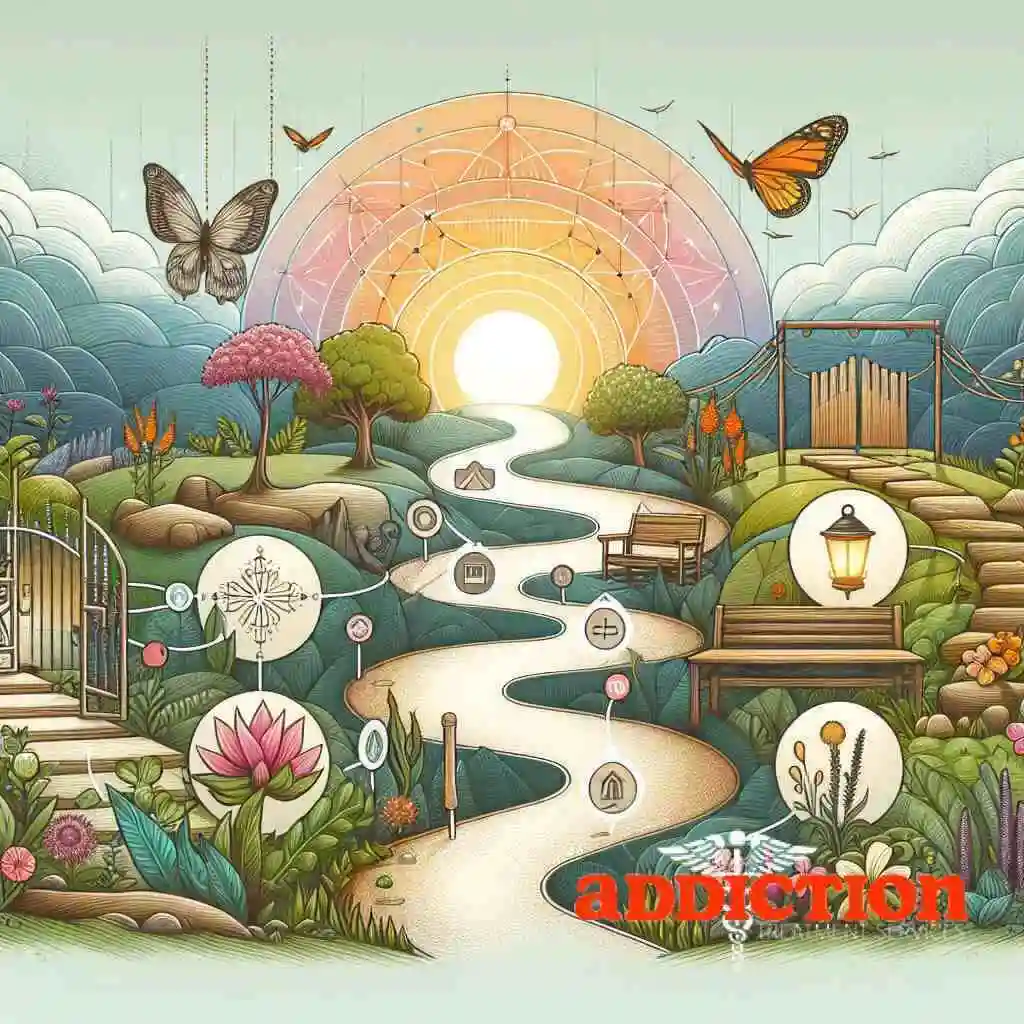 Posted On: 08/29/2024
Posted On: 08/29/2024Understanding the Spectrum of Addiction Treatment
Levels of addiction care
The journey to recovery from addiction is unique for each individual and necessitates a personalized approach to treatment. Addiction Treatment Services provide a wide spectrum of care levels, from early intervention programs to intensive outpatient and residential or inpatient care. Early intervention may be suitable for individuals at the very beginning stages of substance misuse, helping to prevent the development of a full-blown addiction. For those whose substance use disorders have progressed further, more intensive levels of care, such as inpatient or outpatient treatment, become necessary. It’s essential to assess each individual’s circumstances, including the severity of their addiction, their mental health status, and their home environment, to determine the most appropriate level of care.
Addiction treatment strategies
Addiction treatment strategies encompass a broad range of approaches and methodologies, each tailored to address the multifaceted nature of substance abuse and its underlying causes. Effective treatment strategies often include a combination of medication-assisted treatment to alleviate withdrawal symptoms and cravings, psychotherapy for addiction to address behavioral and psychological aspects, and support groups to provide a community of individuals with shared experiences. Additionally, treatment plans may incorporate holistic therapies, such as yoga and meditation, to promote overall well-being. Central to all addiction treatment strategies is the goal of not only achieving sobriety but also equipping individuals with the tools and resources needed for sustained recovery and a healthier, substance-free lifestyle.
Substance abuse treatment plans
Developing a comprehensive substance abuse treatment plan is critical to addressing both the physiological and psychological components of addiction effectively. These personalized plans are crafted by healthcare professionals based on a thorough assessment of the individual’s specific needs and circumstances. Substance abuse treatment plans often include detailed approaches for detoxification services, ongoing therapy sessions, support group meetings, and relapse prevention strategies. With the ultimate aim of helping individuals achieve and maintain sobriety, these plans are periodically evaluated and adjusted to ensure they continue to meet the evolving needs of the person in recovery. For those seeking assistance, resources such as the guide to intensive outpatient programs in Michigan offer valuable information on various treatment services available, aiding in the crucial first step towards recovery.
Residential Treatment Explored
Living at a treatment center
Choosing residential treatment for addiction recovery means committing to live at a treatment facility for the duration of your program. This immersive approach is designed for individuals seeking a comprehensive and structured environment to focus entirely on their recovery. Living at a residential treatment center removes you from the triggers and stresses of your daily environment, which can be crucial for those in the early stages of recovery. In these centers, clients typically have access to around-the-clock support from medical professionals and therapists, along with a schedule filled with therapy sessions, group meetings, and wellness activities. This constant support and structure are significant benefits that can help individuals navigate the complexities of addiction recovery, offering a safe space to heal and build the foundation for a life of sobriety.
24-hour addiction care
One of the primary advantages of residential treatment is the availability of 24-hour addiction care. This round-the-clock support ensures that individuals can receive immediate assistance during moments of acute stress, withdrawal symptoms, or when the temptation to relapse is high. Such intensive monitoring is particularly beneficial during the detox phase, where medical supervision is critical to address any complications that may arise. The continuous care provided in a residential setting promotes a sense of safety and security, enabling patients to focus solely on their recovery without the external pressures or risks associated with their usual environments.
Residential detox programs
Detoxification in a residential setting is designed to safely manage the acute and potentially dangerous physiological effects of stopping drug use. Residential detox programs offer a medically supervised environment where withdrawal symptoms can be closely monitored and treated. Medication-assisted treatment is often available to ease withdrawal symptoms and cravings, making the detox process more comfortable for the patient. This initial step is crucial in the recovery process, as it addresses the physical dependence on substances, paving the way for effective psychotherapy and behavioral treatments to begin. Residential detox ensures that this critical phase is managed with the utmost care, minimizing risks and preparing individuals for the next stages of their recovery journey.
Structured addiction treatment
The structured nature of residential addiction treatment provides a comprehensive framework for recovery, incorporating various therapeutic modalities and activities into a daily schedule. This organized approach includes individual therapy sessions, group therapy, recreational activities, and sometimes holistic therapies like yoga or meditation, all aimed at treating the person as a whole. Such a structured environment helps instill healthy routines and coping mechanisms, replacing the chaotic patterns of addiction with order and purpose. The goal of structured addiction treatment is not only to help individuals achieve sobriety but also to empower them with the skills and confidence needed to maintain a drug-free lifestyle upon their return to everyday life.
Outpatient Care Demystified

Addiction treatment without residency
Outpatient care offers a pivotal solution for individuals seeking addiction treatment without the requirement of living at a treatment facility. This model of care is crucial for those who have responsibilities that cannot be set aside, such as work, school, or family obligations. Outpatient treatment allows participants to maintain their daily routine while accessing necessary support and therapy services. Unlike residential treatment, outpatient care does not provide 24-hour monitoring, placing greater emphasis on the individual’s ability to manage their recovery in the context of their everyday environment. This approach leverages a strong support system at home and in the community, making it an effective option for those with a stable living situation and a moderate level of addiction.
Flexible treatment for addiction
Flexibility is a cornerstone of successful outpatient care. Programs are often scheduled around the patient’s commitments, enabling them to seek treatment without upending their daily lives. This level of flexibility also extends to the types of services provided, which can range from individual counseling sessions to group therapy and educational workshops about substance abuse and relapse prevention. Outpatient care can vary in intensity, with programs tailored to meet the unique needs of each person, including evening and weekend sessions for those who cannot attend during traditional hours. This adaptability ensures that more individuals can access the help they need when they need it, leading to better outcomes for recovery.
Intensive outpatient program
An Intensive Outpatient Program (IOP) is designed for those who need more support than what traditional outpatient care offers but do not require or cannot commit to residential treatment. IOPs provide a structured therapy program that includes multiple sessions per week, often totaling more than nine hours of therapy. These programs focus on helping individuals develop coping strategies, healing underlying issues related to their addiction, and building a supportive network of peers and counselors. Despite being non-residential, IOPs offer a rigorous treatment model that closely mirrors the comprehensive care found in inpatient facilities, making it a viable option for those with serious, albeit not life-threatening, levels of addiction.
Scheduled addiction treatment options
Outpatient treatment provides a variety of scheduled options to cater to the diverse needs of those in recovery. From low-intensity programs that may involve a few hours of therapy each week to more intensive options like the IOPs mentioned above, outpatient care is designed to be as inclusive as possible. These scheduled treatment options allow for continuity of care, ensuring that individuals can progressively work on their recovery goals with minimal disruption to their personal and professional lives. Through carefully structured schedules, outpatient programs can effectively support individuals in their journey toward long-term sobriety, leveraging both the flexibility and the accountability that scheduled sessions offer.
Choosing Between Inpatient and Outpatient Treatment
Assessing your addiction therapy options
When it comes to navigating the recovery journey, choosing the right path between residential (inpatient) and outpatient treatment can be a pivotal decision. This choice fundamentally depends on various factors, including the severity of addiction, individual health needs, personal responsibilities, and available support systems. Residential treatment may be the best course of action for individuals with severe addiction issues who require a structured environment and 24-hour care to avoid the risk of relapse. On the other hand, outpatient care might suit those with milder forms of addiction who have strong support networks and cannot take extended leave from work, school, or family commitments. It’s essential to contact us for substance abuse treatment for a personalized assessment to determine which treatment option aligns best with your specific situation, ensuring a tailored approach to recovery that considers all aspects of your well-being.
Continuous care in addiction recovery
One of the critical factors in the success of addiction recovery is continuous care, which varies significantly between inpatient and outpatient settings. Inpatient facilities offer an immersive environment with constant supervision and support, making it easier for residents to focus solely on their recovery without the distractions or triggers of their regular life. This continuous, enveloping care provides a strong foundation for sobriety, especially in the early stages of recovery. Conversely, outpatient programs offer flexibility, allowing individuals to integrate treatment into their daily lives, which requires a higher level of self-discipline and the ability to navigate potential triggers while receiving support through scheduled treatment sessions. Both pathways emphasize the importance of ongoing care, tailoring their approaches to fit the patient’s specific level of need and lifestyle, ensuring a continuum of support throughout the recovery process.
Support in addiction treatment
Support systems play a crucial role in the efficacy of both inpatient and outpatient addiction treatment programs. In residential settings, patients benefit from a built-in community of peers and professionals, all working towards a common goal of recovery. This community provides a sense of belonging and understanding that can be powerful in overcoming the challenges of addiction. Outpatient services, while less immersive, often incorporate group therapy and support networks, such as Alcoholics Anonymous Meetings accessibility or Narcotics Anonymous, to foster a sense of community and shared experience. Access to these supportive communities can significantly influence an individual’s ability to navigate the complexities of recovery, reinforcing the importance of selecting a treatment option that provides the right level of communal support.
Addiction treatment environments
The environment in which addiction treatment takes place can significantly impact an individual’s recovery journey. Inpatient or residential treatment facilities offer a controlled, secure environment removed from everyday stressors and triggers, often featuring serene, retreat-like settings conducive to healing and self-reflection. These environments are meticulously designed to support individuals through their recovery process, from detox to therapy and beyond. Outpatient programs provide flexibility, allowing individuals to remain in their home environment while attending scheduled treatment sessions. This option requires a stable, supportive home environment and relies heavily on the individual’s commitment to recovery and ability to manage exposure to triggers. The choice between these environments should carefully consider personal needs, lifestyle, and the level of support available, ensuring the chosen treatment setting fosters an atmosphere where recovery can thrive.
Navigating the Journey Towards Recovery
Recovery from addiction is a multi-faceted journey that requires a comprehensive approach encompassing not only the initial treatment phase but also long-term management and support. It’s a process that Addiction Treatment Services profoundly understands, providing guidance and resources to navigate this challenging yet hopeful path.
The Role of Early Intervention
Early intervention in addiction can significantly alter the trajectory of an individual’s recovery journey. Recognizing the signs of substance misuse early and taking action can prevent the development of severe substance use disorders. Addiction Treatment Services emphasizes the importance of early intervention strategies, offering resources and support to families and individuals at the earliest signs of addiction. The early intervention strategies for addiction in Florida highlight the proactive steps that can be taken to address substance misuse before it escalates, demonstrating the critical role of timely action in the process of recovery.
Recovery Support Services
Support services play an indispensable role in the journey towards lasting recovery. Beyond the initial detox and treatment phases, maintaining sobriety requires ongoing support and resources. Addiction Treatment Services provides access to a wide array of recovery support services, including peer support groups, therapy, and sober living environments. These services offer a supportive community and the necessary tools to manage the challenges of post-treatment life, reinforcing the journey towards a sober and healthy lifestyle.
Relapse Prevention Strategies
Relapse prevention is a cornerstone of sustained recovery. Developing strategies to identify and manage triggers, stress, and other factors that could lead to relapse is crucial, as outlined in our essential tips for relapse prevention in NJ. Through comprehensive treatment programs, individuals learn coping mechanisms and skills to handle life’s challenges without resorting to substance use, as explored in our guide to finding the best outpatient services near me. Addiction Treatment Services offers resources and guides on building a robust relapse prevention plan, emphasizing the importance of continuous self-awareness and active management strategies in preventing relapse.
Behavioral and Mental Health Services
Addressing the underlying behavioral and mental health issues associated with addiction is essential for a holistic recovery process. Many individuals facing addiction are also dealing with co-occurring mental health disorders, making integrated treatment approaches that address both substance use and mental health necessary. Addiction Treatment Services connects individuals with behavioral and mental health services for addiction, providing access to psychotherapy, medication-assisted treatment, and other therapies. These services are crucial for treating addiction’s root causes and facilitating a comprehensive healing process.
Addiction Treatment Services continue to guide individuals and families through the complexities of addiction recovery, emphasizing holistic, compassionate care. From the critical early intervention steps to the ongoing support and specialized services required for a successful recovery journey, the path to sobriety is a continuum of care that necessitates a tailored approach for each individual. Through its dedication to connecting people with the right resources and treatment options, Addiction Treatment Services stands as a beacon of hope and guidance in the fight against addiction.
Frequently Asked Questions
Question: What are the main differences between residential treatment and outpatient care offered by Addiction Treatment Services?
Answer: The main differences between residential treatment and outpatient care lie in the intensity, setting, and structure of the programs. Residential or inpatient addiction treatment provides an immersive therapy experience where individuals live at the treatment center, receiving 24-hour care and support. This option is ideal for those with severe substance use disorders or those who require a structured environment away from daily life stressors. On the other hand, outpatient addiction treatment offers flexibility, allowing individuals to receive therapy and support while continuing their daily activities, such as work or school. Outpatient care is often suited for those with milder forms of addiction or strong support networks at home. Addiction Treatment Services offers both levels of care, ensuring tailored approaches to meet individual recovery needs, emphasizing continuous, quality care for a successful recovery journey.
Question: How do I choose between inpatient vs. outpatient rehab programs through Addiction Treatment Services?
Answer: Choosing between inpatient vs. outpatient rehab programs involves assessing multiple factors regarding your situation or that of a loved one. Key considerations include the severity of the addiction, the presence of supportive environments, personal responsibilities, and ensuring that your choice aligns with your specific needs for recovery. Addiction Treatment Services provides a holistic evaluation to help determine the most fitting program, incorporating personalized addiction therapy options and continuous care strategies designed to support long-term recovery. Our team is dedicated to guiding you through this crucial decision, ensuring you have access to the necessary information, from the benefits of living at a treatment center for focused recovery to the advantages of non-residential addiction help that allows you to maintain everyday responsibilities.
Question: Can Addiction Treatment Services help me if I need detoxification before starting a recovery program?
Answer: Absolutely. Addiction Treatment Services recognizes the critical importance of safely managing withdrawal symptoms through medically supervised detoxification services. Whether you require a residential detox program to address the physiological effects of stopping drug use or are looking for outpatient detox options with medical supervision, we offer a range of detox services to suit your needs. Our detoxification services are the first step towards recovery, preparing you for further treatment, whether that be in our structured residential recovery programs or through our flexible outpatient recovery services. Detox is a vital component of our comprehensive substance abuse treatment plans, ensuring a safe and supportive beginning to your journey toward sobriety.
Question: What ongoing support does Addiction Treatment Services offer for maintaining sobriety post-treatment?
Answer: Post-treatment, maintaining sobriety is a continuous journey that requires ongoing support. Addiction Treatment Services offers comprehensive recovery support services designed to reinforce your sobriety and support long-term recovery. This includes access to therapy, peer support groups such as AA Meetings or NA Meetings, and sober living environments. Our relapse prevention strategies are integral to our programs, teaching coping mechanisms and providing tools to manage potential stressors or triggers. We are committed to supporting every individual beyond the initial treatment phase, ensuring you have access to the resources and community needed to sustain recovery.
Question: In the blog post “The Difference Between Residential and Outpatient Care,” how is the importance of the environment addressed in addiction recovery?
Answer: In “The Difference Between Residential and Outpatient Care,” the importance of the treatment environment in the recovery process is highlighted as a critical factor influencing an individual’s journey toward sobriety. Residential treatment facilities offer a controlled, secure setting that’s conducive to healing, free from the daily stressors and triggers, often featuring serene, retreat-like settings. Outpatient programs, while providing more flexibility, rely on the individual’s capability to manage exposure to everyday triggers, necessitating a stable, supportive home environment. Addiction Treatment Services carefully assesses each individual’s situation to recommend the most appropriate environment that fosters healing, whether that involves the immersive setting of inpatient care or the adaptable nature of outpatient services, guaranteeing environments that promote successful recovery outcomes.



